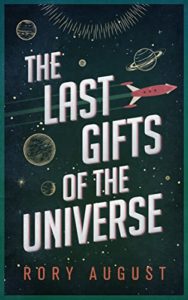
The first round of the second annual Self-Published Science Fiction Competition (SPSFC2) has ended, and my team has hand-picked three semifinalists to send to two other teams of fellow judges. In return, we have received six semifinalists from two other judging teams, which we will read before the end of April. One that I was happy to see in my batch, after hearing some rave reviews outside the competition, was The Last Gifts of the Universe by Rory August.
The Last Gifts of the Universe stars two siblings working for a non-profit that sends them to the stars, searching for records from dead civilizations, hoping to find some clue as to the nature of the disaster that has destroyed every known non-human society. In addition to the isolation of traveling through space with just one human companion (there’s also a cat), the lead is still working through their grief over the death of their mother. And as if the psychological difficulties weren’t enough, there’s a much less ethical and better-funded group also tracking down dead civilizations in hopes of monopolizing alien technologies.
It comes together into a really impressive final product. In fact, as we pass the midpoint of this year’s completion, The Last Gifts of the Universe has ascended to the top spot of the books I’ve read as an SPSFC2 judge. It has a few missteps, but it does so many things very well.
Honestly, my only real complaints are small plot details—the sort that aren’t really vital to the story but may break immersion a time or two. The most obvious is the translation technology, which is unbelievably good, with live translations available mere seconds after discovery of a new people with a new language. Of course, implausibly effective universal translators are a well-worn sci-fi trope, often used to smooth the path to whichever encounters between different species the author chooses to prioritize. But here, in a story about searching for clues in the ruins of dead civilizations, the translation element felt more vital, and I had trouble overlooking how easy it was. Beyond that, there was an over-the-top action scene or two and an incredibly intense connection between the lead and their cat that probably works fine for pet people but felt a bit jarring to me.
So much for the “why I’m not dropping my first five-star rating of the competition” section of the review—now on to the reasons it’s my highest score so far. First of all, it’s an incredibly easy read, with a smooth prose style and an urgency from the central mystery that makes it hard to put down. Despite my small complaints, the overall plot is still plenty interesting, and the character work is exceptional. The lead’s current relationship with their brother and past relationship with their mother unfold slowly over the course of the book, both built on deep affection but challenged by the different visions of a good life. This allows the book to explore grief, regret, and even loneliness within the context of strong and healthy relationships.
But The Last Gifts of the Universe doesn’t turn entirely on the main plot, or even the main character. Interspersed are snippets collected from one of the data caches, telling of the life of a leader of a long-dead alien civilization. These selections constitute a story every bit as good as the main plot, with a touching romantic subplot and a tight focus on those moments that so deeply affect individual lives. If these pieces of story were stripped of their context and repackaged as a novelette, it would be a good novelette. But they’re even better in the context of a broader novel in which they can reach across the temporal gulf and profoundly affect still another life.
The Last Gifts of the Universe is a really excellent book, and I’ll be unpleasantly surprised if it doesn’t garner a place in the finals. There were a few immersion-breaking moments that held me back from a five-star rating, but there are plenty of five-star elements here, led by the outstanding interpersonal character work. The romantic subplot, the exploration of grief, and the focus on the little moments that change lives all make it well worth the read, and the central plot is a whole lot of fun as well. Recommend!
Recommended if you like: conflict within healthy relationships, explorations of grief, space opera.
Can I use it for Bingo? It’s hard mode for Published in 2022, Standalone, and Mental Health, and it’s also Self-Published with Family Matters.
Overall rating: 16 of Tar Vol’s 20. Four stars on Goodreads.
SPSFC score: My personal score will be 8/10. The official team score will be decided in concert with my teammates.
